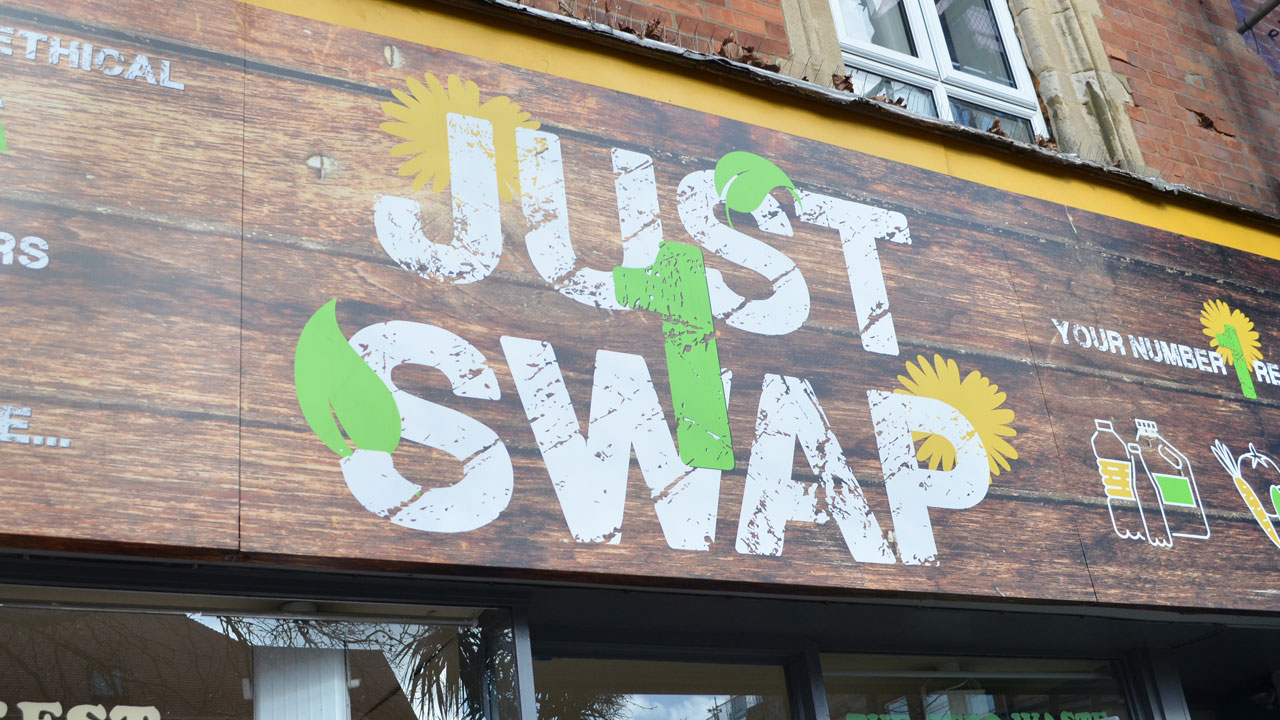
Just1Swap | Support Our Independents
22/03/2023
By Lee Nottle
At the end of February, Lee from Essential travelled to Boscombe in sunny Bournemouth to meet Ellen at Just1Swap. Inside there is a bounty of zero-waste provisions all carefully curated to utilise the space in the shop. Shop owner Ellen has had a varied career; it was through her background in Biological Forensic Anthropology that Ellen saw first-hand the negative impact of single-use plastics and this ultimately led to her following her childhood dream and opening her own shop. Ellen spoke with us about how the opening of Just1Swap came about, dispels the myth that zero-waste stores are expensive compared to chain supermarkets, and talks about the difficult times ahead for small business owners.
Can you begin by telling us a bit about the history of Just1Swap?
So, I have to go quite far back. I'm a trained Biological Forensic Anthropologist. That's what I used to do for many years. It’s just a very fancy way of saying I used to dig up dead people (laughs). I used to analyse and look at skeletons. I have been lucky enough to travel all the way around the world doing excavations, as well as teaching second and third-year degree students. It didn't matter where we were; there was always rubbish in the top layer of the soil. In fact, the top layers always have plastic in them. I've been in some real remote places that you would never think there would be rubbish. I even spent a month in a mud hut in the jungle in India, and there is so much plastic waste. It's heart-breaking. What was really heart-breaking about that was when we'd finished a dig, we used to have to tip it all back in. I wasn't there to filter out rubbish. There wasn't time to filter out rubbish. I spent all of my career putting rubbish back into the soil that we had already dug out. We’d been digging on farmland and it's quite common for farm/agricultural land to have all this plastic in the soil where crops are growing. I've done a lot of digging in Cirencester as well. Even there it's absolutely littered throughout the top soil and there was always no time to do anything about it.
The last 10 years or so of my career I retrained as a GCSE science teacher. I specialised in physics, but also taught students about how plastics are made, what happens with them, how they break down and how destructive they are. I then set up an eco-club with the school to make changes to things like plastic cutlery and also put an onus on the students to actually make significant changes to their own lives. They were also going home and having discussions with parents and things like that. So, that has always been part of my background.
I've always, ever since I was a kid, wanted to be a shopkeeper. It's just a very bizarre and odd thing. I never knew what shop. I just always wanted to have my own business. When my Dad passed away, my husband said, well, you've got some money, why don't you look at what it would cost to set one up? We did research for about two years. We surveyed about 7,000 people, both on the high street and online before we then decided to open. Two things came up; the first one was that people love zero waste shops, but they're too small. The second thing was pricing; why do they have to be so expensive? Those are the two things that we wanted to challenge.
We signed our contract around six months before we'd ever heard of COVID and then three weeks before we opened, the first lockdown was announced. We opened the third week of the first official lockdown. That was our opening day.
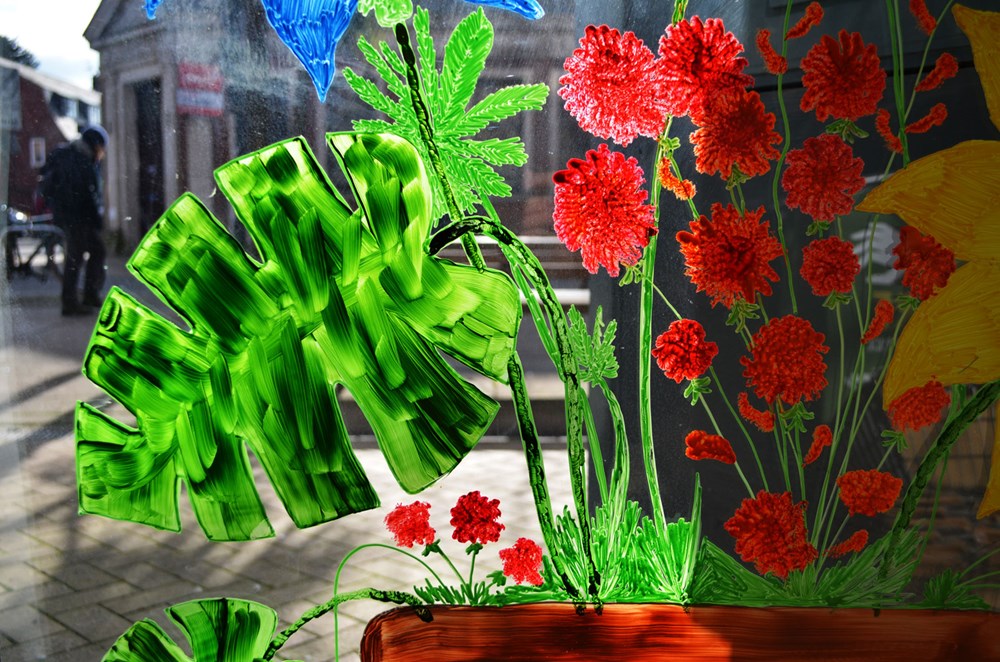
That’s quite a career shift! How did you manage it?
I think because of my background, I've always had a passion for the environment. You know, as archaeologists, the rubbish that we were tipping back in became a really big thing for me that got me thinking, is it possible that we can filter some of this? What can we do to actually help and support this? It was then a natural transition into teaching. I kind of fell into teaching. Then the opportunity to open the club and then the more involved I got with those kinds of things, the more I really wanted to do something about it.
Dorset does have one of the highest concentrations of zero-waste shops within a square mile compared to anywhere in the UK. There are 33 dabbling shops, vans, people with it as a sideline within about a 45 square mile radius, which is actually quite a large concentration. So, we needed to be bigger, better, and cheaper. Those are the three things that we really wanted to do because we wanted to keep the customers coming back. We needed to make sure that pricing is what we addressed first and foremost and get that word across.
Can you tell us a bit about your customers?
We have a really loyal customer base and I think that is the reason we are here today. We have a loyalty program with about 300 customers on it, which doesn't sound a lot compared to somewhere like Boots, but it is for a very small business. In a very short period of time, with the COVID pandemic and now the cost of living crisis, I actually think that's quite an achievement. We have a really diverse range of customers. We've had this discussion on the zero-waste forum a number of times and lots of people say that their customer base is young or old. I think it depends on the demographics of the area and that’s one of the reasons I looked into the demographics here. Boscombe is labelled, you know, a horrible town, but its demographic is actually above the breadline. It has a huge range of ages and people. We have a really vast range of customers. I would say predominantly most of our customers are probably between the ages of, I would say, 25 and 40. But we also have a really large number of elderly people that are either on their own and come and buy one frozen item or a few bits of pasta as well. I think we are really lucky to have such a diverse range. I think the town itself is really tight-knit. All the shops work closely at helping to promote each other and bring people into town and I think that's really important. I think word of mouth has been our saving grace. So yeah, I would say we are very diverse here.
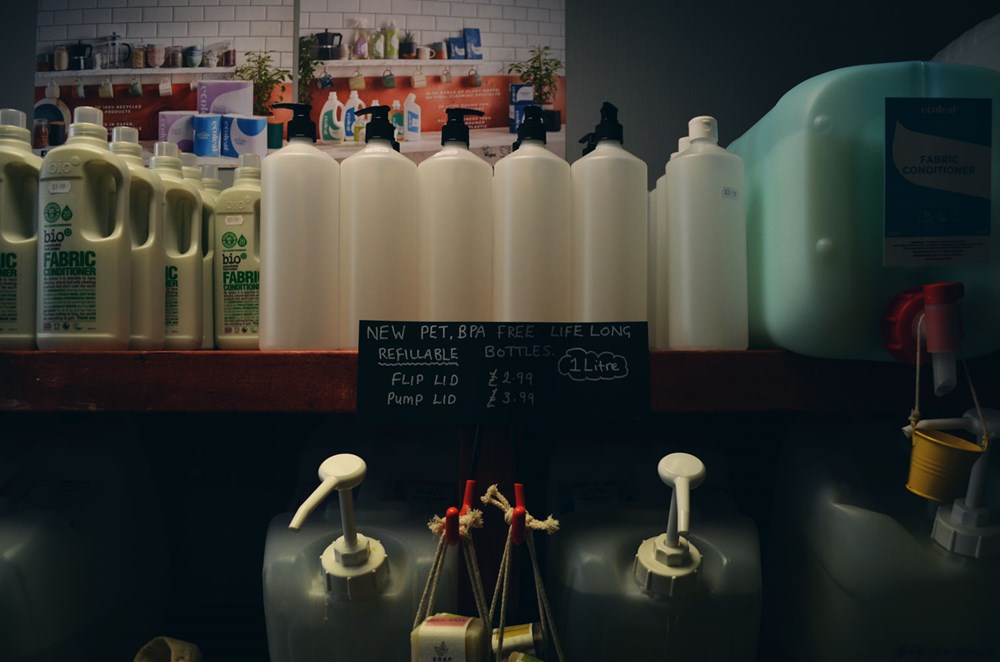
Some people still believe that shopping at zero-waste stores is unaffordable. I find that when you shop at places like Just1Swap, you actually save money compared to supermarkets. How do you dispel this myth?
There's a number of things. We price per hundred grams and there's a reason why we don't price per kilogram. Rarely anybody buys per kilogram and they look at the price per kilogram and think it’s expensive. Most people only buy 200 grams of something at most. But then also I think there is something – I call it ‘scoop fever’ – in which people come in and they look at that price for a hundred grams, and they think this is cheap, so they get 10 scoops of it, which they would never really buy in a supermarket. I think that's the first thing that we need to address, especially for new customers. We are very aware of this and if somebody's new we try and help them buy only what they need. I think that is the biggest issue. If they've got a big jar for some reason, they want to fill a big jar. To save money you only need to be buying what you need per week. We've had people come in and buy five litres of laundry liquid on their first go. Well, you might not like it, so don't buy five litres. Buy a sample instead. You know, two washes cost you pennies. If you don't like it, you haven't lost any money. But if you buy a litre or five litres and you don't like it, it then becomes a waste of money. I think it's just trying to get people's brains around how to shop this way.
Most zero-waste stores are independent, which means we all have our own pricing. If people have been into one zero-waste shop before and didn’t like it, for whatever reason, don't let that put them off trying a different one. We all have a different area, different rates, different rents, and a different price point and a different target group. And that's what's more important. If you're in a more affluent area, maybe that shop's completely organic, then you're going to be looking at spending more money. But if you come in here to shop with us, we are not purely organic and we are aiming to accommodate the working-class people of this area so that they can save money. So, yeah, if you've been into one and you've been put off, don't let that put you off trying another shop because we are all so different.
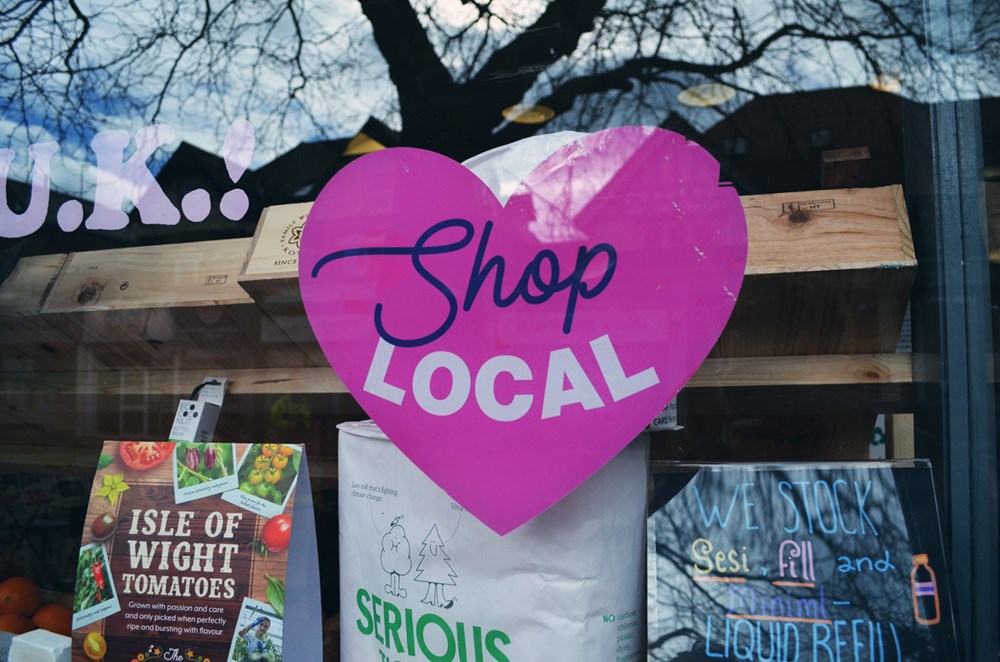
The first time I visited the shop, I was amazed at the incredible selection of zero-waste and sustainable products you have. Is this something that is still growing and how do you decide what products you are going to stock?
Absolutely. It's a hard one because you've got to do the research. The number one thing people want to know is why we are different from the supermarket and it’s because we know the ins and outs of all of our products. We know where it has come from. Although the terminology zero-waste and plastic-free has been stuck to the shop and it is terminology that we have to use on Google because they're what people search for, neither of those terms I agree with. There's no such thing as zero-waste. Not for you and not for us as a shop. There is no such thing. It's about how we are reusing those products and how we are disposing of them.
For me, the first thing I look at when companies approach us to sell their products, is the company background, their ethics, and what they do to give back to people. A lot of them do like 1% for the planet, they use plastic free, they plant trees, they save bees, etc. For us, it's about the ethics of them; the traceability of their products is really important. I've had it before, a lady came in, put out a load of soaps and said these are my soaps, handmade, all organic, completely natural. I was sure I'd seen them before. I did a Google Reverse Image Search and found that they were cheap soaps bought from China. They were completely unethical; they were not natural. I challenged her, she did admit to it, but also said that nothing she had done was illegal. You absolutely have to be on the ball with this kind of thing. You have to do your research because, if you don't, somebody else will.
How did things change for you when the coronavirus pandemic hit and do you feel this prepared you for the cost of living crisis?
Absolutely not. The cost of living crisis is something completely different to COVID. If COVID wasn't bad enough, the cost of living crisis is 10 times worse. Obviously, we opened three weeks into the first lockdown. At that time, in the first lockdown, the whole high street was closed. We only have one very small Sainsbury’s over there that was open just off the high street. We didn't have any footfall through the high street at all. We had a big event organized and we planned the whole lot. All of that was cancelled as we had no way of getting the word out. Luckily, when we opened, we did have a small reserve in the bank, but that went really, really quickly. Unfortunately for us, all of the COVID funding streams, we were declined for. We never received any support from Bournemouth, Christchurch and Poole Council at all. We had the original loan that everybody got. Apart from that, we didn't get anything because they only supported hospitality/leisure and we came under retail. We had to literally struggle through it. To be fair, after about six months, word spread because we are on the corner of the high street and people that drive through could spot the sign outside the shop.
There were a small handful of people that helped us share content on Instagram and grow our customer base that way. Eventually people then saw that we were here and when the next lockdown happened, we were in a much better position because people knew that we would be open. I think that saved us because we had no extra support. Then comes the cost of living crisis, which has hit us 10 times harder than COVID ever did because that's a lack of money in people's pockets. COVID wasn't about a lack of money in people's pockets. It wasn't seeing a £3,000 electric bill a year. We went from £70 a month and our last bill was £349. So along with that, you know, rates coming back in, rent going up, gas, and electricity here, you know, nearly quadrupling as well. Plus, the lack of customers is a much worse situation than COVID ever was. I think it's going to be a really difficult 12 months, not just for us, not just for every other zero-waste shop, but for everybody. I think only those with a very good customer base are going to be the ones that can really sort of triumph through.
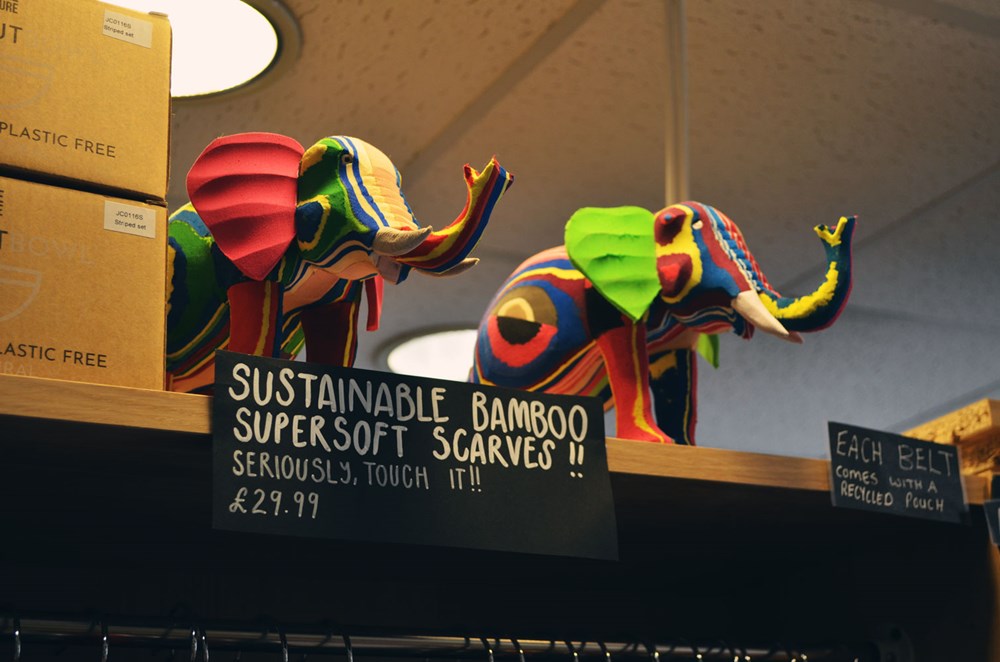
What does the future have in store for Just1Swap?
I think that is unknown. I don't think I can honestly answer that. I am hoping that because we are one of the bigger ones, that'll hold us in good stead. We have literally only raised about 8 prices in the last three years. We have really absorbed a lot of the price rises and a lot of the costs, but some things are going up so fast now. In the next couple of months, we do have to look at that again, which may mean price rises, which may have a significant effect on us.
Lots of people are now upcycling and into making old things good. So, I think that is the next avenue to explore. But, of course, you need money in the bank to buy these goods. Most of these companies used to offer credit terms. They've now stopped that, I don't know many that are now offering credit terms because so many small businesses have gone bankrupt or bust. So, they all want money up front. Therefore, we have to find the money first. I think there is a massive question mark over that.
Today you've seen a lot of people come in, but yesterday I only took £17. So, we've decided to close now on Mondays. It's just absolutely not worth it. A lot of small businesses here close on Monday and we pay out more than £17 in electricity for the day. We are already looking at reducing our hours. I had a full-time member of staff, who I dismissed in January because sales had dropped so significantly. I would have to worry whether I could pay her every month and I had to take that worry away. Which is horrible because she's a local girl, and therefore that then puts her in hardship, as well. So, the knock-on effect is much bigger than just a shop owner and a shop because we only have one Saturday girl now, also me, and occasionally my husband steps in. But that's it. A shop of this size needs two or three more people, but we can't afford it. So, at the moment there is just a massive question mark.
If you are interested in participating in an upcoming Support Our Independents episode, we would love to hear from you! We want to represent as many businesses as possible and highlight how diverse independent businesses are. Simply email marketing@essential-trading.coop with Support Our Independents in the subject line and we will get back to you as soon as we can.
Our next feature will be on Herbivore Vegan Deli in Bristol.